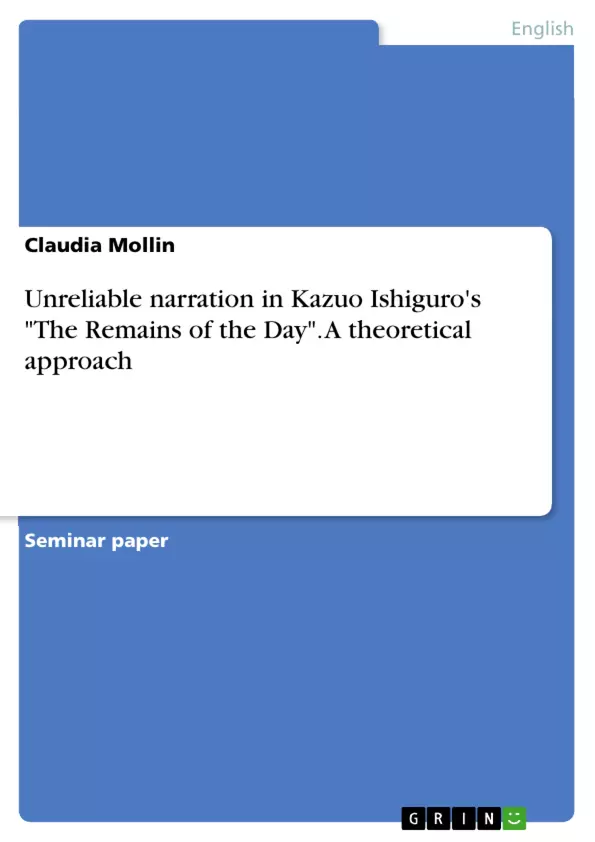This paper examines the narrator's reliability of Kazuo Ishiguro's The Remains of the Day. The author of this paper aims to do this while casting a critical eye on aspects that may hint at Steven being an unreliable narrator. Therefore, this paper also takes into account aspects that could lead to the conclusion of Steven being a reliable narrator.
Firstly, the crucial term unreliable narrator is going to be defined. Then, two long accepted theoretical approaches are going to be presented, namely, Frany Stanzel’s concept of Narrative Situation and Gérard Genette’s Structuralist Theory.
Indeed, being aware of these narratological concepts is of vital importance for the reader. That is, it enables the latter to better keep track of how to analyze the narrative Structure in "The Remains of the Day" properly.
The next step is applying these concepts to, the concrete example of, the narrator in The Remains of the Day.
Secondly, several respective clues which backup the hypothesis of Unreliable Narration will be presented. More precisley, passages of the here discussed novel that specifically meet the criteria of inconsistency, incoherence and lack of correspondence will be pointed out. The approach to the subject will be a theory and analytical method based, close reading of "The Remains of the Day". All in all, it is going to be argued that, since the narrator of The Remains of the Day meets the criteria of inconsistency, incoherence and lack of correspondence, he should be considered unreliable.
Inhaltsverzeichnis (Table of Contents)
- Introduction
- Unreliable Narrator and Narrative Situation in General Terms
- Definition of unreliable narration / What is an unreliable narrator?
- Detecting Unreliable Narration in The Remains of the Day.
- Restated thesis statement / Summary of main points.
Zielsetzung und Themenschwerpunkte (Objectives and Key Themes)
This paper aims to explore the phenomenon of unreliable narration by analyzing the narrator in Kazuo Ishiguro's novel The Remains of the Day. It will define the concept of unreliable narration and compare it to established narratological theories. The paper will also examine specific clues within the text that support the thesis of unreliable narration.
- Defining the concept of unreliable narration
- Analyzing the narrator in The Remains of the Day
- Exploring the connection between narrative structure and unreliable narration
- Identifying specific textual clues that support the thesis of unreliable narration
Zusammenfassung der Kapitel (Chapter Summaries)
The paper begins with an introduction outlining the significance of unreliable narration in literary studies and introducing the central argument that the narrator in The Remains of the Day can be considered unreliable. The first chapter provides a detailed definition of unreliable narration, addressing its complex and often ill-defined nature. It critiques existing definitions and introduces a new, more comprehensive approach. The second chapter examines specific aspects of the novel, highlighting clues that support the thesis of unreliable narration. These clues are presented in a theoretical and analytical framework, demonstrating how the narrator's inconsistencies, incoherence, and lack of correspondence point to his unreliability.
Schlüsselwörter (Keywords)
The main keywords and focus topics of the paper include unreliable narration, narrative situation, focalization, The Remains of the Day, Kazuo Ishiguro, narrative structure, inconsistency, incoherence, and lack of correspondence. The paper explores these concepts within the theoretical framework of narratology, utilizing both established and newly developed theories to analyze the complex relationship between the narrator and the narrative.
Frequently Asked Questions
What is an unreliable narrator?
An unreliable narrator is a character whose credibility is compromised, often due to bias, mental state, or intentional deception.
Is Stevens in "The Remains of the Day" unreliable?
The paper argues that Stevens meets the criteria for unreliability due to inconsistencies and lack of correspondence in his narrative.
Which theories are used to analyze the narrative?
The study applies Franz Stanzel’s concept of Narrative Situation and Gérard Genette’s Structuralist Theory.
What are the clues for unreliability in Ishiguro's novel?
The paper points out passages showing inconsistency, incoherence, and a lack of correspondence between the narrator's account and reality.
Why is narratological awareness important for the reader?
It enables the reader to properly analyze the narrative structure and better track the narrator's potential distortions.
- Quote paper
- Claudia Mollin (Author), 2020, Unreliable narration in Kazuo Ishiguro's "The Remains of the Day". A theoretical approach, Munich, GRIN Verlag, https://www.grin.com/document/950167



